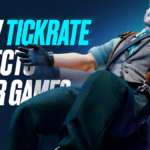The Premier Season 2 has started in Counter-Strike, and all players are required to calibrate once again. Developers use rank resets in competitive games for many reasons—one of which is to combat boosters and smurfs. Today, the CS.MONEY Blog will tell why smurfs ruin CS2 experience.

Vibrant, cool looking CS skins will help you to get the maximum out of the gameplay. You can get them for a low price on our website.
What is smurfing?

Smurfs aren’t just the little blue cartoon characters. In CS2, the term refers to players who use low-ranked or low-rating accounts. For example, someone with a 20,000+ rating on their main account but 7,000 on a second account is smurfing when they play on the lower-rated account.
Why Are Smurfs a Problem?
Because they disrupt matchmaking. Its main goal is to create balanced teams with evenly matched players. This balance is essential—it makes wins feel rewarding, and losses feel fair and preventable.
Smurfs ruin this balance. If one team has a stronger, more experienced player, it spoils the game for everyone. Teammates feel like a burden, opponents feel helpless. That’s totally not good. In other words, one smurf’s fun comes at the cost of a bad experience for nine other players—hardly fair!
How to Deal with Smurfs in CS2?
Let’s start with the bad news: Valve hasn’t cracked down hard on smurfing in CS2. While they’ve taken action against smurfs in other games (like Dota 2), smurfing in CS2 currently doesn’t lead to bans. Technically, smurfing violates Steam’s Code of Conduct, but Valve isn’t enforcing that policy here.
However, you can make life harder for smurfs by reporting them.
Here’s how to identify a smurf:
- Skill Level – The most obvious sign. If a player has a high K/D but doesn’t seem like a cheater, that’s a red flag.
- Check Their Steam Account – Few games, low CS2 hours, and a small friends list could all suggest smurfing.
- Look at Their Inventory – Smurfs rarely bother transferring expensive skins. If their inventory is empty or filled with cheap skins, they might be smurfing.
If all three signs point to a smurf, report them. This can lower their Trust Factor, meaning you’re less likely to encounter them in future games.
For FACEIT Players: You have it easier. FACEIT actively fights smurfing and responds quickly to reports. If you spot a suspected smurf, go to their FACEIT profile and report them—there’s even a smurfing option in the report menu, making the process quick and easy.
How to Start Smurfing in CS2?

First off—don’t.
Smurfing only worsens matchmaking, and playing against weaker opponents is neither satisfying nor good for improving your skills. Just don’t do it. But if you’re still not convinced…
Starting a smurf account in CS2 is easy:
- Create a new account
- Download CS2
- Get Prime Status
- Start playing
However, there are two warnings:
- Don’t buy Prime accounts – It violates Steam’s User Agreement and could lead to a ban.
- We strongly discourage smurfing – Seriously, it’s not worth it.
Smurfs and boosters are an unavoidable part of any ranking system. There will always be dishonest players trying to game the system. The best thing you can do is report them—and don’t join their ranks.
And hey, if you want to avoid getting reported yourself after a great game, why not upgrade your inventory? A few good skins can make a big difference. The CS.MONEY Market is the best place to grab new skins—lower prices, huge selection, and new listings every day. Don’t wait—check it out and start shopping now!

















